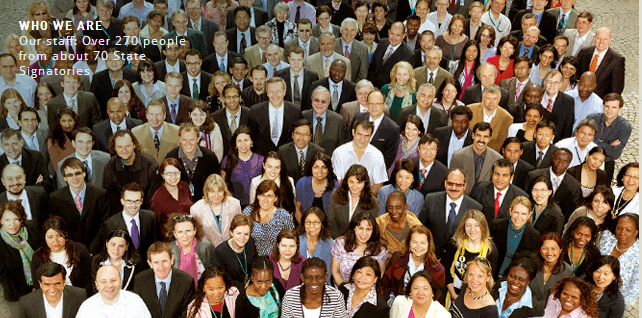世界贸易组织
World Trade Organization
组织领域:经济金融与贸易总部:Geneva, Switzerland
组织性质:政府间 是否有驻华办事处:否
官方网站:https://www.wto.org/

简介:
Mission
The World Trade Organization — the WTO — is the international organization whose primary purpose is to open trade for the benefit of all.
The WTO provides a forum for negotiating agreements aimed at reducing obstacles to international trade and ensuring a level playing field for all, thus contributing to economic growth and development. The WTO also provides a legal and institutional framework for the implementation and monitoring of these agreements, as well as for settling disputes arising from their interpretation and application. The current body of trade agreements comprising the WTO consists of 16 different multilateral agreements (to which all WTO members are parties) and two different plurilateral agreements (to which only some WTO members are parties).
Introduction
Over the past 60 years, the WTO, which was established in 1995, and its predecessor organization the GATT have helped to create a strong and prosperous international trading system, thereby contributing to unprecedented global economic growth. The WTO currently has 164 members, of which 117 are developing countries or separate customs territories. WTO activities are supported by a Secretariat of some 700 staff, led by the WTO Director-General. The Secretariat is located in Geneva, Switzerland, and has an annual budget of approximately CHF 200 million ($180 million, €130 million). The three official languages of the WTO are English, French and Spanish.
Decisions in the WTO are generally taken by consensus of the entire membership. The highest institutional body is the Ministerial Conference, which meets roughly every two years. A General Council conducts the organization's business in the intervals between Ministerial Conferences. Both of these bodies comprise all members. Specialised subsidiary bodies (Councils, Committees, Sub-committees), also comprising all members, administer and monitor the implementation by members of the various WTO agreements.
More specifically, the WTO's main activities are:
— negotiating the reduction or elimination of obstacles to trade (import tariffs, other barriers to trade) and agreeing on rules governing the conduct of international trade (e.g. antidumping, subsidies, product standards, etc.)
— administering and monitoring the application of the WTO's agreed rules for trade in goods, trade in services, and trade-related intellectual property rights
— monitoring and reviewing the trade policies of our members, as well as ensuring transparency of regional and bilateral trade agreements
— settling disputes among our members regarding the interpretation and application of the agreements
— building capacity of developing country government officials in international trade matters
— assisting the process of accession of some 30 countries who are not yet members of the organization
— conducting economic research and collecting and disseminating trade data in support of the WTO's other main activities
— explaining to and educating the public about the WTO, its mission and its activities.
The WTO's founding and guiding principles remain the pursuit of open borders, the guarantee of most-favoured-nation principle and non-discriminatory treatment by and among members, and a commitment to transparency in the conduct of its activities. The opening of national markets to international trade, with justifiable exceptions or with adequate flexibilities, will encourage and contribute to sustainable development, raise people's welfare, reduce poverty, and foster peace and stability. At the same time, such market opening must be accompanied by sound domestic and international policies that contribute to economic growth and development according to each member's needs and aspirations.
链接:http://gj.ncss.cn/org/L7otMsVVBmb71G31g8ghYk.html (职位信息在页面左下角,下同)
全面禁止核试验条约组织筹备委员会
Preparatory Commission for the Comprehensive Nuclear-Test-Ban Treaty Organization
组织领域:和平与安全总部:Vienna, Austria
组织性质:政府间 是否有驻华办事处:否
官方网站:http://www.ctbto.org/

简介:
Mission
The Comprehensive Nuclear-Test-Ban Treaty (CTBT) bansnuclear explosions by everyone, everywhere: on the Earth's surface, in the atmosphere, underwater and underground.
Introduction
It makes it very difficult for countries to develop nuclear bombs for the first time, or for countries that already have them, to make more powerful bombs. It also prevents the huge damage caused by radioactivity from nuclear explosions to humans, animals and plants.
Over 2000 nuclear tests were carried out between 1945 and 1996, when the CTBT opened for signature: by the United States (1000+), the Soviet Union (700+), France (200+), the United Kingdom and China (45 each). Three countries have broken the de facto moratorium and tested nuclear weapons since 1996: India and Pakistan in 1998, and the Democratic People's Republic of Korea (DPRK) in 2006, 2009, 2013 and 2016.
Many attempts were made during the Cold War to negotiate a comprehensive test ban, but it was only in the 1990s that the Treaty became a reality. The CTBT was negotiated in Geneva between 1994 and 1996. One hundred and eighty three countries have signed the Treaty, of which 164 have also ratified it, including three of the nuclear weapon States: France, the Russian Federation and the United Kingdom. But 44 specific nuclear technology holder countries must sign and ratify before the CTBT can enter into force. Of these, eight are still missing: China, Egypt, India, Iran, Israel, North Korea, Pakistan and the USA. India, North Korea and Pakistan have yet to sign the CTBT. The last Annex 2 State to ratify the Treaty was Indonesia on 6 February 2012.
链接:http://gj.ncss.cn/org/LX6BU2tyQFTrWyGoLAFyq7.html










